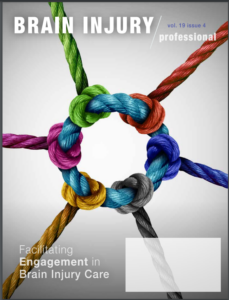
For our colleagues in the field: Facilitating Engagement When Faced with Challenging Patient Behavior
Brain Injury Professional article
Some highlights within:
- Too often, engagement becomes shorthand for compliance, or the extent to which the client’s behavior matches the provider’s recommendations.
- Clients who accept treatment recommendations are seen as “engaged”; those who do not are seen as “challenging”.
- Engagement thereby becomes a patient-level variable, rather than a negotiated process that requires continual renewal in accordance with shifting goals, expectations, and emotional needs.
- The problem with engagement-as-compliance view is that when engagement fails, all efforts focus only on the patient. Moving away from this view requires an awareness that therapeutic engagement after TBI is both an iterative process and a two-way street.
- It requires providers to respond to a lack of engagement with curiosity rather than judgement, in the spirit of non-defensive, flexible problem-solving, & to consider their own role in the engagement process.
- Three TBI Populations described as “Challenging”:1.Those with impaired self-awareness– Poor awareness of neuropsychological deficits is a common correlate of moderate to severe TBI. These clients may see any impairments as overstated or unimportant, creating significant barriers to therapeutic engagement. May see no value in cognitive remediation & will find assessment tasks frustrating and unnecessary.
– Reduced self-awareness after TBI should be conceptualized as an executive functioning deficit involving metacognition. Problems with executive function may be subtle, especially in the context of overt difficulties in memory & language & may present as personality features. Providers can easily fall into the trap of seeing these clients as “resistant” thereby personalizing a lack of engagement, & making it worse.
-Early identification& provider knowledge regarding executive function deficits – including how they can impact self-awareness – are essential. When executive function deficits limits participation, engagement is better served by active problem solving & flexible, compensatory strategies, rather than the assumption of low motivation or denial.
- Those with functional cognitive impairment
– Often seen in mild TBI or post concussion these clients are hyper-aware of cognitive deficits, despite reassuring injury characteristics & unremarkable testing results.
-Fundamentally, the client & provider do not share a mutual understanding of what is wrong.
–This can result in a broken cycle of an increasing demand for more for more or different treatments from the client; fruitless attempts to meet this demand by the provider, & eventual burnout & disengagement on both sides.
–What helps is to emphasize that the client’s cognitive symptoms are subjectively real, troubling and explainable. This shared understanding can help both parties agree on a treatment they can both support & engage in while disrupting any argument about the legitimacy of symptoms.
- Those involved with Worker’s Compensation programs
-As many as 15% of permanent total disability claims through worker’s comp programs are related to TBI.– The structure of Worker’s Comp. programs can present significant barriers to engagement.–The single most important thing a provider can do to improve engagement for these clients is to understand the Worker’s Compensations system in their local setting.
– We hope this can help someone!
